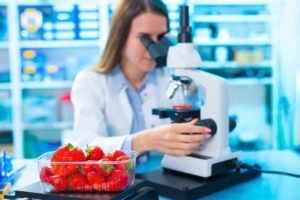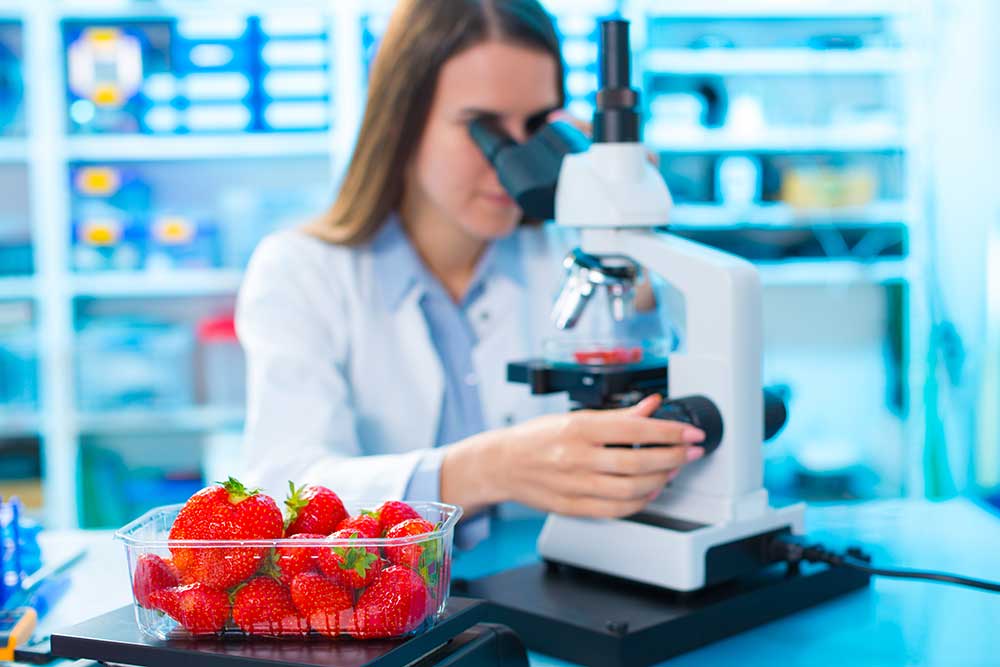Disclaimer: The information on our website is provided for general information purposes only. We make no representations or warranties of any kind, express or implied, about the completeness, accuracy, reliability, suitability or availability with respect to the website or the information contained on our website for any purpose. Any reliance on such information is therefore strictly at your own risk and we are not liable for any damages or losses arising out of or resulting from your reliance on any information contained on our website.
A food scientist studies the deterioration and processing of foods by using microbiology, engineering, and chemistry. Additionally, they determine the nutrient levels of food by analyzing its content. They also look for new nutritional food sources and investigate avenues for making processed foods taste good, safe, and healthy. Next, watch a video to learn more about what a food scientist does.
How to Become a Food Scientist
A food scientist usually requires a bachelor’s degree from an accredited college or university. However, most workers go on to earn a master’s or doctorate. No matter what you decide, these degrees usually include coursework in chemistry, microbiology, and engineering. During school, students will learn to analyze the principles of food deterioration and processing, along with the food’s vitamin, protein, sugar, and fat content.
Certifications are generally not required for a food scientist, but they can help advance your career once you start working. For example, the American Society of Agronomy, Institute of Food Technologists (IFT), and the Soil Science Society of America (SSSA) offer resources and certifications. However, most certifications do require you to pass an exam, have work experience, and earn a related degree. In addition, once becoming certified, you may have to keep up to date by taking continuing education courses each year.
Employers seek food scientists with a lot of experience and knowledge; therefore, it is customarily expected. Some on-the-job training may be given to you as you start your career, but we encourage you to get as much hands-on experience while pursuing your degree. Internships are highly looked upon for prospective food scientists and technologists, and this is a great way to gain hands-on experience and networking with potential future employers.
Job Description of a Food Scientist

Food scientists research new ways to ensure food safety and improve the taste or nutrition of the food. They check for stability and maturity in raw ingredients to ensure products meet the required standards, quality, and nutrient values. They also inspect safety compliance with government regulations regarding sanitation and waste management standards. Besides, develop quality assurance programs for storage operations and food processing, and improving food like texture, flavor, color, chemical composition, convenience, and nutritional value.
A food scientist must remain current on new regulations. They help resolve product development problems by working and consulting with plant operators, process engineers, marketing and packaging specialists, and flavor experts. A food scientist should be able to analyze data, interact with computers, and monitor processors, materials, and surroundings to detect problems.
Most food scientists work full-time hours with some travel required. The majority of food scientists are employed with the federal government, research universities, or private industry—however, some work in offices or food production facilities. The environment can vary and consist of large production machinery, cold temperatures associated with food production or storage, and proximity to animal byproducts. According to the Bureau of Labor Statistics, the focus on diet, health, and food safety may lead to more job opportunities for food scientists.
Free Teacher and Student Resources
Here are a few free resources for students and educators. The American Society of Agronomy has games, lesson plans, and even science projects you can do. Additionally, Khan Academy also has an Introduction to Vitamins and Minerals and Introduction to Carbohydrates course. These are fun ways to learn more about topics that relate to this career field.
Food Scientist Career Video Transcript
With a growing world population, the task of feeding everyone on the planet is getting bigger every day. Key to maintaining the nation’s food supply, agricultural and food scientists research ways to improve agricultural production and food products, while keeping conditions healthy and sustainable on farms, production facilities, and in the soil. Animal scientists research ways to improve the quality and productivity of farm animals for food production, through lowering animal death rates, increasing growth rates, and upgrading their environments.
Food scientists and technologists study the basic elements of food. They analyze nutritional content, discover food sources, and develop ways to make processed foods safe and nutritious. Many create new food products, and research ideas to preserve and package food. Soil scientists examine the composition of the soil, how it affects plant or crop growth, and how different soil treatments affect crop productivity. Plant scientists develop improvements to crop yields and ways to enhance plant production, including controlling weeds and pests. Agricultural and food scientists work in colleges and universities, food production companies, and in scientific research and development. They divide their time between laboratories, offices, and when needed visits to farms and processing plants. Work hours are typically full time, with standard hours. Agricultural and food scientists need at least a bachelor’s degree in their field, or a related science or engineering major. Many pursue graduate degrees.
Article Citations
Bureau of Labor Statistics, U.S. Department of Labor, Occupational Outlook Handbook, Agricultural and Food Scientists.
National Center for O*NET Development. 19-1012.00. O*NET OnLine.
The career video is in the public domain from the U. S. Department of Labor, Employment and Training Administration.

